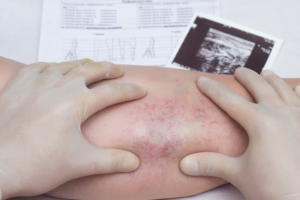 The Tampa cardiovascular physicians and employees at Tampa Cardiovascular Associates are committed to providing our patients with the best available programs for the prevention, diagnosis, and treatment of artery and vein diseases.
The Tampa cardiovascular physicians and employees at Tampa Cardiovascular Associates are committed to providing our patients with the best available programs for the prevention, diagnosis, and treatment of artery and vein diseases.
Our physicians maintain Board Certifications and are Affiliate Associate Professors in the USF College of Medicine, Department of Cardiology Our office labs are certified by ICAEL, ICANL, and ICAVL. Our advanced in-office testing includes a Phillips iE33 which allows us to perform 3D echocardiograms along with strain and speckle tracking. We also perform stress echocardiograms, nuclear stress testing (using a GVI nuclear stress machine which allows the patient the comfort of sitting up during testing), exercise stress testing, micro T wave Alternans, electrocardiograms, Holter monitoring, event monitoring, tilt table testing, 24 hour blood pressure monitoring, and pacemaker/ICD checks.
Dr. Sawar joined Tampa Cardiovascular Associates in 2009 and is currently a managing partner of the practice.
Following a residency in Cardiology at the University of South Florida, Dr. Sawar completed a Fellowship in Interventional Cardiology at Yale University. He holds 3 Board Certifications in Interventional Cardiology, Cardiovascular Diseases, and in Internal Medicine, and is a Fellow of the American College of Cardiology (FACC). Dr. Sawar is also a Clinical Assistant Professor at the University Of South Florida School Of Medicine. He has a keen interest in structured heart disease and is a senior member of TAVR team which also performs MitraClip procedures. Dr. Sawar also performs Peripheral intervention, Vein intervention, Watchman procedure, Pacemaker Implant, Defibrillator Implant and performs complex angioplasty procedures of the heart.
Visit www.TampaCardio.com to learn more or schedule your appointment.


 The professional Cardiologists at Tampa Cardiovascular Associates of Tampa Bay, Florida are here for you.
The professional Cardiologists at Tampa Cardiovascular Associates of Tampa Bay, Florida are here for you.
 Watching someone have a fainting spell can be alarming. They look a little pale, slightly off, and often their eyes will roll back in their heads just before going limp.
Watching someone have a fainting spell can be alarming. They look a little pale, slightly off, and often their eyes will roll back in their heads just before going limp.
 Unwanted side effects are the downside of blood pressure medication.
Unwanted side effects are the downside of blood pressure medication.
 Hypertension has long been known as the silent killer.
Hypertension has long been known as the silent killer.

 Varicose and spider veins are unsightly and sometimes embarrassing. It’s easy to consider them just a visual issue and dismiss them. The problem is that they are a medial issue that can become worse over time. The time to stop them is now.
Varicose and spider veins are unsightly and sometimes embarrassing. It’s easy to consider them just a visual issue and dismiss them. The problem is that they are a medial issue that can become worse over time. The time to stop them is now.
 Infective Endocarditis is an infection of the endocardium, by way of bacteria or fungus. It often leads to the onset of symptoms such as fever, anemia, heart murmurs, petechiae, and embolic phenomena.
Infective Endocarditis is an infection of the endocardium, by way of bacteria or fungus. It often leads to the onset of symptoms such as fever, anemia, heart murmurs, petechiae, and embolic phenomena.
 Anxiety disorders affect 40 million adults in the USA.
Anxiety disorders affect 40 million adults in the USA. 
 Pelvic Congestion Syndrome is a chronic medical condition that affects nearly 1/3 of all women at some point during their lifetime.
Pelvic Congestion Syndrome is a chronic medical condition that affects nearly 1/3 of all women at some point during their lifetime.